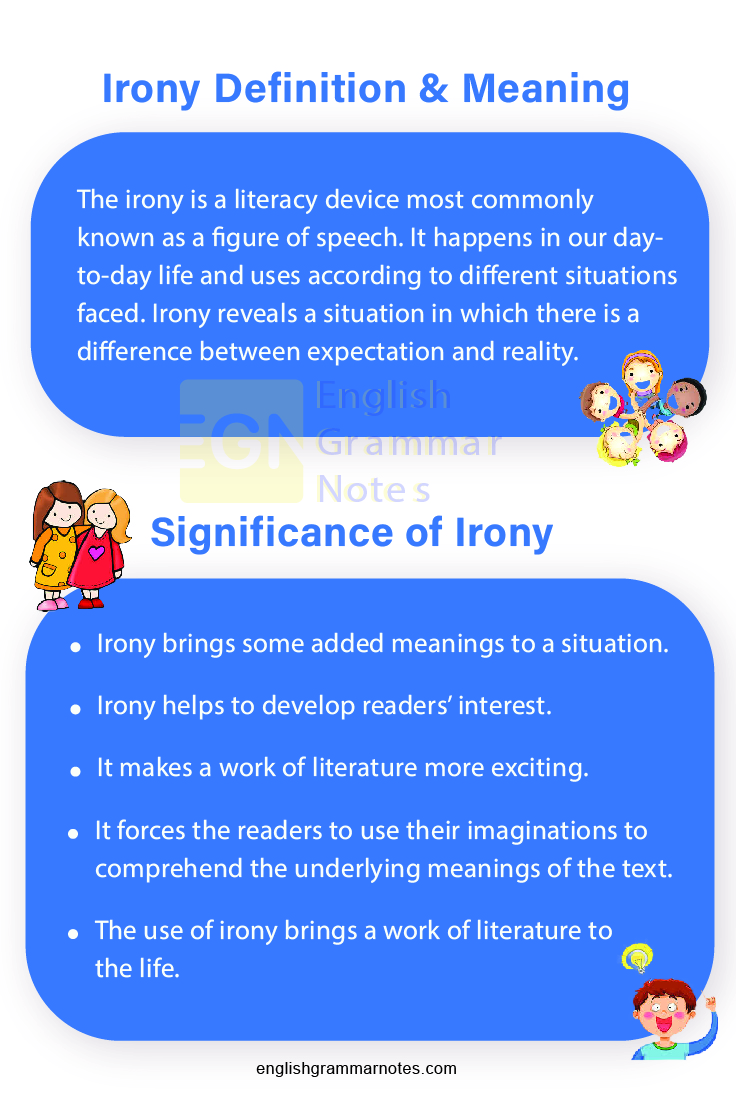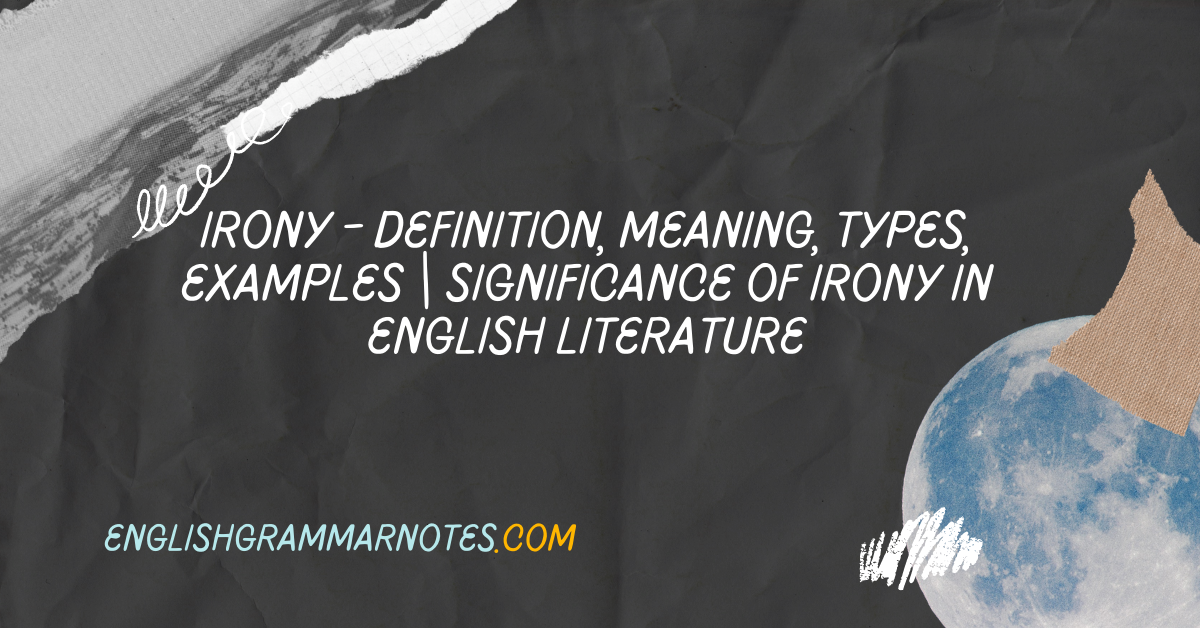The literary device is essentially a technique used by a writer which adds substance or an effect to the text they are writing. The literary device can include works of fiction, poetry, songs, and non-fiction pieces. In today’s article, we will discuss briefly Irony which is a literary device. We will also be knowing its types, functions, role in literature, what is its needs, and various examples to understand in a much better way.
- Irony Definition & Meaning
- Irony Meaning in Literature
- Types of Irony
- Significance of Irony
- What are the three reasons for using irony?
- What is ironic sarcasm?
- What are the types of verbal irony?
- What are the examples of irony?
Irony Definition & Meaning
The irony is a literacy device most commonly known as a figure of speech. It happens in our day-to-day life and uses according to different situations faced. Irony reveals a situation in which there is a difference between expectation and reality. It can be the use of words that are opposite of what you mean. We face ironic incidents in our day-to-day life too. Ironical situations and statements in literature ‘develop readers’ interest’.
Irony Meaning in Literature
When irony is used in literature, students will be able to:
- Identify irony in literature and films. With this, they could identify the difference between three main types of irony that is verbal, situational, and dramatic.
- They will be also able to analyze a plotline in relationship to the author’s use of irony.
- After analysis, it becomes very easy to evaluate the effectiveness of the author’s use of irony in any given statement.
Types of Irony
There are three types of Irony and they are explained here
1. Verbal Irony
2. Situational Irony
3. Dramatic Irony
Verbal Irony
Verbal irony takes when the speaker says something in sharp contrast to his or her actual meaning. Here are examples of Verbal Irony
- If someone has a painful visit to the dentist and when it’s over says, “Well, that was pleasant”.
- When a fake person is saying some kind words to a man and a man even too knows that the person is playing around. Even though after the man says, “How kind you are”.
- Here is an example of verbal irony in conversation. “Oh well, that is just brilliant”. It’s an example of verbal irony that is used when something bad happens.
- “Perfect. This day could not get any better”. It’s a form of verbal irony wherein things go consistently wrong when trying to approach other things in a day.
Situational Irony
Situational irony consists of situations in which outcomes are very different from what was expected. Here are examples of situational Irony
- When someone is waiting eagerly to get a project many times but when he/she receives that project, he or falls ill.
- The local fire station has burnt to the ground. This is a situational irony since this is the place that should be most safe from fire.
- A girl left his boyfriend at the time of marriage. The boy left his entire family in order to marry that girl.
Dramatic Irony
It’s also known as tragic irony where a writer knows everything that’s going to happen, but the character doesn’t know what’s going to happen or who is playing the role. This is mostly used in tragic plays.
We will have a look at different examples of dramatic irony
- When you watch a drama as an audience you know that there is poison in the juice, but the character who is drinking it doesn’t know at all.
- A woman thinks her boyfriend is acting strangely because he’s about to propose to him, but the audience knows that he’s planning to run away with another woman playing with her emotions.
Someone who is planning a surprise birthday party and not knowing that the person who has a birthday will be away on holiday when it’s thrown. - This is an example of dramatic irony in literature. In the fairy tale beauty and beast, wherein audience knows from the beginning that the beast is going to turn into a handsome prince. But, the main character Belle is not aware till the end of the story.
See More:
Significance of Irony
- Irony brings some added meanings to a situation.
- Irony helps to develop readers’ interest. This is effective for readers in that irony can create humor and suspense, as well as showcase character flaws or highlight central themes in literacy words.
- It makes a work of literature more exciting.
- It forces the readers to use their imaginations to comprehend the underlying meanings of the text. It’s essential that the audience must have an understanding of the discrepancy between appearance and reality in work.
- he use of irony brings a work of literature to the life. Therefore it’s best to be aware of readers’ and viewers’ expectations of reality in order to create unexpected outcomes.

FAQs on Irony
1. What are the three reasons for using irony?
The irony is mostly used to create suspense or tragedy in dramas or to create romantic tensions. It is also used to create comedy or empathy (the ability to understand and share the feeling of another).
Sarcasm is a form of irony that is directed at a person with the intention of criticizing.
3. What are the types of verbal irony?
One type of verbal irony is sarcasm. In sarcasm irony, the speaker says the opposite of what he or she means in order to mock down. Other types include overstatement or exaggeration.
4. What are the examples of irony?
Irony examples are:
- She said with irony: “I am happy”.
- The audience could sense the irony in his speech.
- The irony is that our brave soldiers were martyred for the selfish interest of the politicians.
